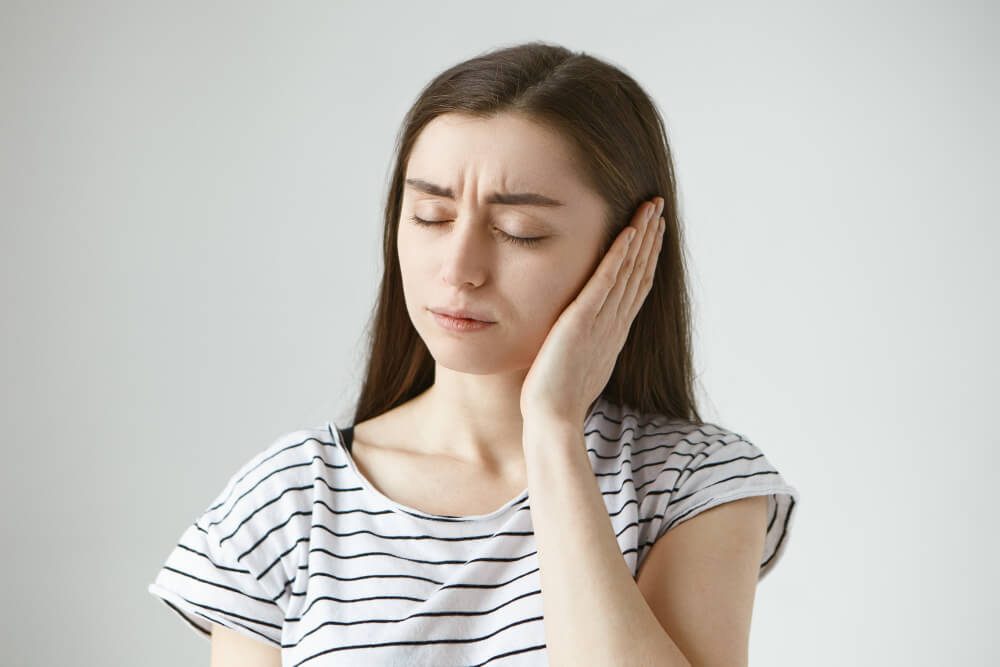Can Grinding Teeth Cause TMJ?

If you’ve ever woken up with a sore jaw or found yourself clenching your teeth without realising it, you might’ve asked the question: can grinding teeth cause TMJ?
The answer is yes—teeth grinding (also known as bruxism) can contribute significantly to temporomandibular joint (TMJ) problems.
And if you’re living with jaw discomfort, frequent headaches, or clicking sounds when you chew, your habits might be affecting more than just your smile.
How Grinding Affects Your Jaw
When you grind your teeth—whether during sleep or throughout the day—you’re applying repeated pressure to your jaw joints. These joints, located on either side of your head near your ears, are responsible for everything from chewing to speaking.
They’re incredibly complex and delicate. So, when you clench or grind your teeth, you’re asking a lot from these small but vital joints.
Over time, this constant stress can cause inflammation, strain the surrounding muscles, and lead to dysfunction—what we refer to as TMJ disorder or TMD. You might not even realise you’re doing it until the symptoms start creeping in.
That dull ache in your jaw? The tension headaches in the morning? A clicking noise when you open your mouth? They might all be pointing to the same issue.
Why You Might Be Grinding Your Teeth
You’re not alone. Many people grind their teeth, often without even realising it.
Stress is one of the biggest culprits. Maybe you’re under pressure at work, juggling responsibilities at home, or going through a particularly tense time in life.
Your body sometimes deals with stress by clenching the jaw or grinding the teeth—often during sleep when you’re not even aware of it.
Other contributing factors can include:
- Misaligned teeth or bite
- Sleep disorders like sleep apnoea
- Stimulants such as caffeine and alcohol
- Certain medicines
If these causes aren’t addressed, the grinding continues—and so does the damage.

TMJ Symptoms You Shouldn’t Ignore
Let’s get real—TMJ issues can sneak up on you. You might start with a bit of tension in your jaw and brush it off, thinking it’s just from sleeping wrong.
However, over time, those minor issues can escalate into more significant problems.
Here’s what you should look out for:
- Jaw pain or stiffness, especially after waking
- Clicking, popping, or grinding sounds when opening or closing your mouth
- Limited movement in your jaw
- Earaches or a feeling of fullness in the ears (even if there’s no ear infection)
- Headaches or facial pain
- Worn-down teeth or increased tooth sensitivity
When these symptoms become part of your routine, it’s time to take action. Ignoring them won’t make them go away—and if grinding is the root cause, you’re likely doing more harm than good by letting it continue unchecked.
The Long-Term Impact of Unmanaged Bruxism
One of the reasons it’s essential to address teeth grinding early is that the damage doesn’t stop at the jaw joint. Over time, bruxism can lead to:
- Cracked or broken teeth
- Gum recession
- Flattened or shortened teeth
- Tooth sensitivity from enamel wear
- Chronic facial pain
These issues don’t just affect how you feel—they impact how you eat, speak, and carry yourself every day. Even worse, they can lead to expensive dental work down the track if left untreated.
What You Can Do to Protect Your Jaw
The good news? You can take control of this.
The first step is recognising that grinding your teeth is not something to shrug off. It’s a sign your body needs help.
Here’s what you can start doing:
1. Visit Your Dentist
A proper diagnosis is essential. Your Albury dentist can examine your bite, check for signs of wear, and determine if grinding is the source of your TMJ symptoms.
In many cases, a custom night guard is recommended to reduce the pressure on your jaw while you sleep.
2. Manage Your Stress
Since stress is a significant trigger for grinding, it’s worth looking into stress-reduction strategies.
This could include daily walks, yoga, mindfulness exercises, or setting aside time to unwind. When your mind relaxes, your jaw follows suit.
3. Adjust Daily Habits
Try to become aware of when you’re clenching during the day. Many people tense their jaw while working on the computer or driving.
A simple reminder—like a sticky note on your monitor—can help you stay mindful. Avoid chewing gum or biting nails, as these habits can worsen muscle tension in the jaw.
4. Correct Bite Misalignment
If an uneven bite or crooked teeth cause your grinding, orthodontic treatment may be recommended to address these issues. Straightening your teeth isn’t just cosmetic—it can help balance pressure across your jaw.
5. Monitor Your Lifestyle Choices
Nighttime grinding can be reduced by consuming less alcohol and caffeine, especially before bedtime. Improving your sleep routine overall will also play a significant role in minimising clenching at night.
You Don’t Have to Live with Jaw Pain
Living with TMJ symptoms can affect more than your physical health—it can wear on your patience, your energy, and your overall quality of life. But once you understand the connection between grinding and TMJ issues, you’re in a better position to address it head-on.
You deserve relief. You deserve to wake up without jaw pain. You deserve to enjoy meals without discomfort.
If you suspect grinding may be causing your TMJ problems, don’t wait for things to get worse. Talk to a dental professional who understands what you’re going through and can guide you to the proper treatment.
Teeth Grinding and TMJ Treatment in Albury
If you’re ready to stop the cycle of grinding and discomfort, book a consultation today. Our team at Kreativ Dental Albury will help you uncover the cause and offer practical, personalised solutions to protect your teeth, your jaw, and your peace of mind.
You don’t have to live with TMJ—let’s find your way forward together.
Call us at (02) 6021 4171 or visit us at 525 Wilson St. in Albury.